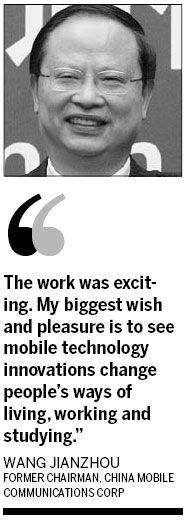
|
 China Mobile started to build up nine business bases in different Chinese cities from 2006, including a mobile video base in Shanghai. [Photo / China Daily] |
Wang Jianzhou describes his three decades in telecom sector as exciting
On March 22 Wang Jianzhou retired from his work as chairman of China Mobile Communications Corp and the group's listed subsidiaries. He attended a farewell meeting in the morning and delivered a short speech. When he finished, thunderous applause broke out and Wang gave a deep bow to colleagues. The applause went on and on, so Wang stood up and bowed again.
Some people said they were deeply moved at that point. "I couldn't see his face but I had a view of an old man's back. I almost burst into tears because he had been with us for so many years," a China Mobile official, who declined to be named, said.
In his last exclusive interview during his tenure, which was with China Daily on March 9, Wang confessed he enjoyed every day of the past three decades working in the telecommunications industry. "The work was exciting. My biggest wish and pleasure is to see mobile technology innovations change people's ways of living, working and studying," Wang said.
Born in Hangzhou, the capital city of Zhejiang province, Wang remembered he only called home once in three years when he lived in the countryside in the late 1960s.
It took him three hours to get through and hear his parents' voices. He had had to walk for half a day along mountain tracks to get to the nearest village's post and telecommunications office.
Things changed fast. China now had close to 1 billion cellphone users by the end of February. Even in rural areas, many farmers own mobile handsets. In big cities, some people have more than one cellphone. Wang carries five handsets every day, using them to test the quality of wireless networks.
'Elephant running'

Wang took the helm of China Mobile in 2004. Over the past seven years, the company has consolidated its leading position in the domestic market. Boasting a huge subscriber base and market value, it has undergone rapid development.
In particular, between 2004 and 2008, China Mobile achieved double-digit growth rates both in revenue and net profit. Wang described it as an "elephant running".
In 2004, the revenue and net profit of China Mobile Ltd was 192.4 billion yuan and 42 billion yuan, respectively. The figures almost tripled and reached 528 billon yuan and 125.9 billion yuan in 2011. The combined net profit of rivals China Unicom (Hong Kong) Ltd and China Telecom Corp Ltd in 2011 was 20.7 billion yuan.
During the same period, China Mobile's subscriber base grew to about 650 million in 2011 from 204 million in 2004. The company started to provide third-generation (3G) wireless network services in 2009, and achieved more than 51 million 3G service users, or about 40 percent of China's 3G market, by the end of 2011, the most among the three Chinese operators.
One of the most important driving forces of China Mobile's development came from the exploration of China's rural market, which has a population of more than 700 million.
When Wang first came up with the idea to extend China Mobile's services to rural areas, investors raised their opposition because they thought such business would bring little profit for the company.
However, Wang insisted on the strategy and created a practical business model for low-end rural users by slicing the marketing cost greatly.
The financial results showed that Wang was right. In the following three years from 2006 to 2008, the average net-profit growth rate reached 28.3 percent annually. The increase in subscribers became the major earnings momentum and nearly half of new users came from rural markets.
For Wang, the service coverage in rural areas had more significance than merely making money. An extraordinary company stands out because of its contribution to society, rather than its huge scale, Wang wrote in his book Davos Notes, which was published in September 2011.
 Toyota to recall 1.4m cars in China
Toyota to recall 1.4m cars in China Overseas energy projects get green light
Overseas energy projects get green light Use of RMB as settlement currency rise
Use of RMB as settlement currency rise Daimler starts new $2.4b plant
Daimler starts new $2.4b plant